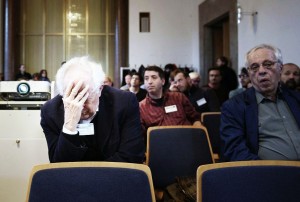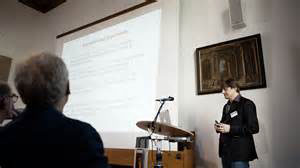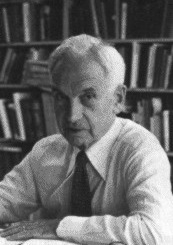 The status of evolution as a science is verging closer to extinction following a workshop in Germany last month. The essence and definition of science were on center stage at this historical convening of the leading physicists and philosophers of science last month.
The status of evolution as a science is verging closer to extinction following a workshop in Germany last month. The essence and definition of science were on center stage at this historical convening of the leading physicists and philosophers of science last month.
The meeting convened in the Romanesque-style Ludwig Maximilian University lecture hall. Science writer Natalie Wolchover covered the story for Quanta Magazine entitled “A Fight for the Soul of Science” and later reprinted on TheAtlantic.com entitled “Physicists and Philosophers Hold Peace Talks.”
The fundamentals of physics currently face a critical problem, explained Nobel laureate David Gross to the three-day workshop attendees – a watershed moment for science. Wolchover explained, “desperate times call for desperate measures.” Specifically, at stake is whether the new concepts emerging in physics – specifically, the string and multiverse concepts – is true science or just a philosophy. The pivotal issue centers on whether empirical evidence is still required to establish a scientific theory. Since science standards apply across the spectrum of the natural sciences, the outcome also determines the science status of evolution by means of natural selection.
Evolution’s Science Status
The crisis tip-point occurred with the publication of controversial ideas advocated by Richard Dawid (pictured to the right), an Austrian philosopher, in the 2013 book “String Theory and the Scientific  Method.” The problem stems from the absence of empirical evidence to scientifically support these new concepts. Dawid argued that the essence and definition of science should be revised to allow for three kinds of “non-empirical” evidence. The testability and falsifiability requirements of the Scientific Method would be optional.
Method.” The problem stems from the absence of empirical evidence to scientifically support these new concepts. Dawid argued that the essence and definition of science should be revised to allow for three kinds of “non-empirical” evidence. The testability and falsifiability requirements of the Scientific Method would be optional.
In response to Dawid proposal, George Ellis from the University of Cape Town and Joe Silk of the Paris Institute of Astrophysics (the two white-haired physicists pictured above in the front row) called for a consensus workshop to assess Dawid’s proposal in an “incendiary opinion piece” in Nature (2014) entitled “Scientific Method, Defend the Integrity of Physics – attempts to exempt speculative theories of the Universe from experimental verification undermine science.
Debate
Finally, last month one hundred attendees convened to wage, in what Ellis and Silk declared, a “battle for the heart and soul of physics.”
Ellis and Silk accuse string and multiverse conceptualists of “moving the goalposts” of science and blurring the lines between physics and pseudoscience. As Wolchover explains, the new theories are of a –
“wildly speculative nature of modern physics theories… a dangerous departure from the scientific method. Many of today’s theorists — chief among them the proponents of string theory and the multiverse hypothesis — appear convinced of their ideas on the grounds that they are beautiful or logically compelling, despite the impossibility of testing them.”
The problem is that the ancients used beautiful and logical ideas – otherwise known as deductive reasoning – ended up wrong theory. Historically, the deductive reasoning track record has been a disaster in discovering the secrets of nature. Aristotle (384-322 BC), one of the most famous Greek philosophers, once reasoned that the “Earth is the center of the universe.” However, when Aristotle’s idea was tested using only empirical data, Nicholas Copernicus (1473-1543) successfully falsified Aristotle’s reasoning – but at a great personal sacrifice.
In the opinion of Ellis and Silk (2014),
“The imprimatur of science should be awarded only to a theory that is testable… Only then can we defend science from attack.”
Outcome
Gross, a prolific string advocate, who was awarded a Nobel Prize in 2004, had kicked off the workshop by noting that the problem lies not with physicists, but with the “fact of nature” – an excellent example of anthropomorphic arrogance.
Over three winter days, scholars struggled with the meaning of scientific theory, confirmation, and truth; how science works; and whether, in this day and age, philosophy should guide research in physics or the other way around. Over the course of the workshop, any degree of consensus to move the “goalposts” of science was lost in the resulting blur of confusion.
To the question of whether testable and falsifiable is still required to validate a concept as scientific, there was no new consensus. If a theory has no predictive value, can it be scientific? There was no new consensus. What keeps theorists within the bounds of science? There was no new consensus.
Commenting on the use of non-empirical concepts in science, Dawid noted, it
“opens the floodgate to abandoning all scientific principles… Clearly, the risk is there.”
Wolchover echoed Dawid’s concern.
“the trash heap of history is littered with beautiful theories… [but], theoretical beauty is not always true.”
The workshop was an unparalleled twenty-first century watershed moment fighting for the essence and definition of scientific standards. In the end, no cohesive consensus emerged to move the science “goal post.”
With his pet string theory on the line, Gross reluctantly simply countered with –
“I will continue to work on it.”
Reader’s Comments
Wochover’s article spawned more than 70 reader comments. Excerpts include –
“If a hypothesis is not falsifiable, it’s Not scientifically valid.” Paul Mays
“Empiricism is at the core of science. Empiricism is what took us out of the dark ages and into the light.” Dan Hess
“Recent results have shown that… theories like a ‘Universe from Nothing’ all have serious issues, as they are not even mathematically viable leading to all sorts of singularity behavior.” Ikjyot Singh Kohli
“Whereas physics, the study of nature is about what can be observed, not about what cannot be observed, as a matter of principle.” Patrice Ayme
“Pure logical thinking cannot yield us any knowledge of the empirical world; all knowledge of reality starts from experience and ends in it. Propositions arrived at by purely logical means are completely empty as regards reality.” Elliot McGucken
“String theory is pseudoscience – what a waste of talent and effort. Vibrating energy strings is a misconception.” Victor Vaguine, PhD
“When the subject of physics is not testable (as is the universe as a whole), the physics becomes a metaphysics.” Marcel Chelba
“Science is one form of social action that, practiced well, can take us beyond the accidents of our personal prejudices and predilections and broaden our intellectual vistas.” Russell Seitz
“Science is physics; String Theory is metaphysics. It isn’t Science.” T S Seethaler
“I’m not sure how you’d falsify the theory of evolution.” Lewis Robinson, MD
“Without experimental verification, there is no difference between science and religion, or politics for that matter.” Sean Sun
Darwin’s dilemma intensifies.
Evolution’s Science Status
Like the string and multiverse concepts, evolution does not include any testable or falsifiable empiric evidence from the fossil record, embryology, molecular biology, and genetics. As a result, evolution’s scientific status is verging closer to extinction.
 Evolution’s science status problem is not a new concern. Even Darwin’s “bulldog” of the twentieth century, Ernst Mayr (pictured), eventually drew the conclusion that “biology [evolution], even though it has all the other legitimate properties of a science, still is not a science like the physical sciences.”
Evolution’s science status problem is not a new concern. Even Darwin’s “bulldog” of the twentieth century, Ernst Mayr (pictured), eventually drew the conclusion that “biology [evolution], even though it has all the other legitimate properties of a science, still is not a science like the physical sciences.”
Since the theory of evolution does not meet the criteria of a scientific theory, educational systems must only teach biological evolution as a philosophy – not as a science. Loyalty to a metaphysical theory of nature taught as scientific fact is destroying the essence of science in the classroom.
The teaching of biological evolution today is equivalent to teaching Aristotle’s geocentric – the “Earth is the center of the universe” – model in the science classroom.
Despite a flood of challenges since the publication of The Origin of Species in 1859 by Charles Darwin to prove otherwise, the scientific evidence on the laws of nature continues to be compatible with the Genesis record written by Moses.
Refer to the Glossary for the definition of terms and to Understanding Evolution to gain insights into understanding evolution.

